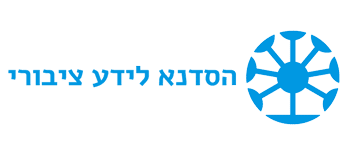בהמשך לסדנת “איפה הכסף” של Transparency and Accountability Initiative מובילי מפתח התקציב, מושון זר-אביב ואדם קריב, השתתפו גם בוובינר. הינה הרשמים:
On 26 February we were delighted to host a live discussion featuring participants from our recent “Follow the Money” Workshop in Berlin. Guest speakers from several countries recounted their insights from the two-day event and, more importantly, brought stories and samples from works in progress that draw on their Berlin conversations. A full archive of the Webinar is available to play online. You can also download the slide presentation (pdf).
Andrea Menapace led off the discussion by reviewing the purpose of our “Follow the Money” (FTM) activities. While the Workshop’s first practical aim was to share experiences about how tech can add value and what’s really needed to bring change, our more ambitious aim was to find concrete areas for potential new work, and to help spark collaborations with true potential for impact.
Four gifted guests from the Berlin cohort joined several dozen listeners to talk about current FTM collaborations, ideas, and project strategies.
From Israel, Mushon Zer-Aviv and Adam Kariv introduced the group to Obudget.org, a transparency tool for understanding the Israeli budget. As Mushon recently explained on our blog, the timeliness of the tool’s budget data is a distinctive feature which was itself made possible only through effective campaigning by Public Knowledge Workshop.
To post a good-looking site with previously unavailable government data was a big step, said Zer-Aviv, but conversations in Berlin spurred the team toward new ways to make the site data more usable. “In addition to making it user-friendly and colorful,” he said, “it does need some introduction.”
Zer-Aviv and Kariv created a “tour” feature for Obudget.org, an annotated step-by-step guide to the tools. As they worked, Zer-Aviv said, they had an even deeper insight. “We realized that beyond just showing how the features work, it could become a way of actually telling stories,” he said.
“We are seeking ways to bridge storytelling and data,” said Kariv, to add “the narrative aspect we find so lacking.”
Beatrice Martini, one of the great co-organizers of the Berlin Workshop, then presented a concept born during the Workshop and taking shape collaboratively with fellow participants Jean Brice Tetka and Jay Bhalla.
Pooling their experience from a broad spectrum of countries and contexts, the three saw many common challenges in planning fiscal transparency projects. They wanted to solve this design problem with something besides a generic template. They wanted something that invites campaigners to apply their local context by “putting someone into the problem, into the system,” said Tetka.
Their idea? A role-playing game for planning “Follow the Money” campaigns. As Martini and Tetka explained, the game would require players to define the ecosystem, actors, “rules,” goals and challenges in the context of their own advocacy. To give an example, Tetka used the fight against Ebola to illustrate how transparency advocates could use the game’s framework to support planning. With Ebola, he said, “public attention was enormous, but focused on the disease and less on the money needed or being open.”
Martini offered images from other role-playing games that give players divergent perspectives on a social issues, as she and her colleagues hope to do with their project. They also plan to develop case studies based on their early experiments, and are currently seeking interested collaborators.
You can find more of Martini’s smart breakdowns of the FTM meeting in her two recent blog posts.
From Lorenzo Segato, we heard about the Open Detective Project, a plan to link law enforcement experts and technologists to help “detect and prosecute” corruption in public procurement. The idea is a continuation of the TACOD project, launched in 2014 by Segato’s organization RiSSC and several partners.
Echoing many past TABridge conversations, Segato said he and his corruption-fighting colleagues at RISCC know that data alone is never sufficient to reveal and prevent corruption. At the same time, he said, “the capacities of law enforcement, mass media and the civil society to use open data are very weak.”
The Open Detective Project was conceived in conversations in Berlin, said Segato, as he and David Cabo of Civio and Eva Vozarova and Zuzana Wienk of Fair-Play Alliance described their shared need for cooperation between the “separate worlds” of anti-corruption and open data.
Segato described how the partners then coordinated on a tight turnaround to submit a proposal to the European Union for project funding. “Everyone brings their own competence to the project,” he said.
Our guest speakers then answered questions submitted by the international webinar audience. For a full record of the Q&A, see the archive link below. Segato captured the spirit of our FTM Workshop vividly when he talked about the importance of dialogue across a wide network. “Sometimes you can be jealous about your ideas,” he said, but when you keep your work to yourself, it “forces other people to reinvent. When everyone is open for discussion, your partners can help you refine your idea. We don’t want to start from nothing.”
Many other Workshop participants have been blogging about their own “Follow the Money” efforts on the TABridge blog. Watch our site for more updates on these emerging projects, and for more, we encourage everyone invested in this work to join the growing Follow the Money network at followthemoney.net.
To review the 26 February webinar, please visit the event audio archive, or download the slide presentation (pdf).




השאירו תגובה
רוצה להצטרף לדיון?תרגישו חופשי לתרום!